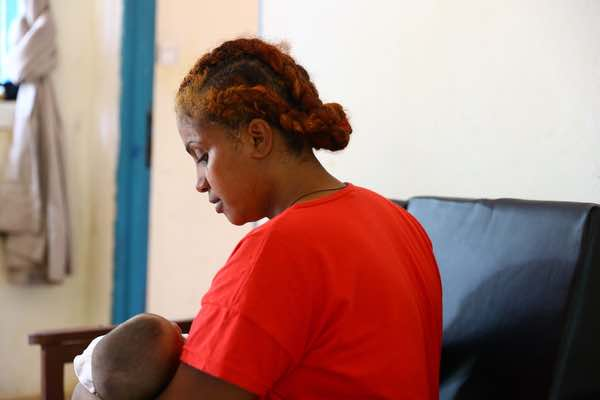
Akira, 33, comforts her newborn baby girl at the Emergency Transit Mechanism Centre in Rwanda
“Talking and sharing our own personal stories helps build a community that can talk about gender-based violence and ultimately ensure its prevention.”
This is the motto of the Ndumwigeme committee in Mahama refugee camp. A women’s committee set up by Ange Niyonkuru, a Burundian refugee who fled her home in 2015, after she saw the extent to which gender-based violence (GBV) was prevalent in her community.
On a mission to break the silence surrounding GBV, Ange explains how women and girls are often fearful to report their experiences due to embarrassment and stigma that may occur after speaking up. But how she believes that building trust and creating safe spaces can help combat it.
“Gaining the trust of the community is important. People may see refugee women who experience violence as weak victims or blame them for what happened, but that must change. Because victims are often hopeless, but survivors are hopeful.” Ange comments.
As part of her work, Ange and the Ndumwigeme committee work closely with UNHCR, Save the Children and other partners in the camp to break down barriers around GBV.
The name “Ndumwigeme” comes from a Kirundi term that translates to a “girl”, however, for the committee and the community, it means “a girl who has good behavior, who has values and respects herself”. As the president of the committee, Ange is determined to support women and girls to stand up for their rights.
It is this sense of purpose to create a better community that is being celebrated during 16 Days of Activism Against Gender-based Violence in 2022. Female activists like Ange, Akira and Jacqueline are disrupting old ways of responding to gender based violence and challenging traditional mentalities about how women survivors should behave.
Ange especially believes in the power of education as a tool in the fight against GBV. She states that education is key to help refugees and women more generally, understand the world they live in and have the ability to fight back. “When refugee girls lack opportunities to rise out of poverty, someone can take advantage of them by offering something as small as a biscuit.”
Education is also something that Akira, 33, an Ethiopian refugee mother of two , believes strongly in as a means of combating GBV.
“In schools, children need to have lessons on GBV, learn about the different types of violence, the impact it has on the survivor and the consequences that should be taken against the perpetrator. Otherwise, communities, religion and culture normalize it and it will continue to happen.”
After being evacuated from Libya to Rwanda as part of the Emergency Transit Mechanism, Akira was elected as a community leader and has made it her mission to raise awareness among her community about gender-based violence while she awaits resettlement to a third country.
She also believes that encouraging refugee women to share their experiences is an important means of restoring hope and dignity among those who were traumatized during their journeys to try and find safety. “I have seen refugee girls experience horrific violence and sexual assault because they have no power or resources. Refugees in Libya are stripped of their power in detention centres, in the hands of smugglers, and even by authorities.”
In Kigali, it is also Jacqueline’s own experience of experiencing sexual harassment which spurred her to help other women who have experienced violence. As a Burundian refugee, business owner, and a single mother of two, she faced unwanted sexual advances from a potential business partner while trying to make ends meet during the COVID-19 pandemic in 2020. “He asked me to meet in a hotel to discuss, and when I arrived, he tried to force himself on me. He thought he could take advantage of me because I was a refugee mother trying to feed her kids.”
Overcoming this trauma, shaped Jacqueline’s outlook for the future and she now works with refugee women in her community to build their knowledge about preventing abuse and what they should do if they experience it. She has also opened up her home to refugee children going through tough times.
Bringing women and girls together is a common theme of female refugee activists trying to tackle gender-based violence in Rwanda. In Mahama camp, the ‘Girls Evening’ organized by Ange and the Ndumwigeme committee has created a safe space for women to share their experiences without judgement. While at the ETM, community meetings organized by Akira and others help refugees and asylum seekers process everything they have gone through.
Encouraging women to speak up, even if just among friends, is slowly helping these vulnerable refugee communities to believe in a better future. (End)
